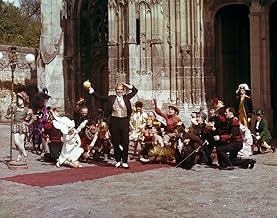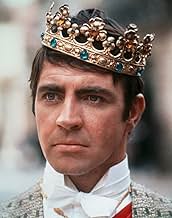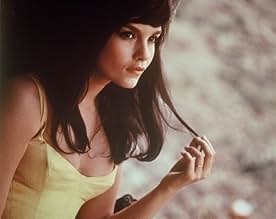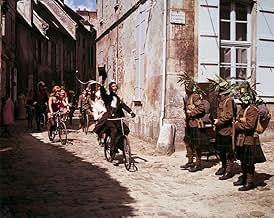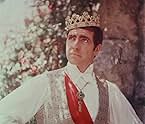Kurz vor Ende des 1. Weltkriegs soll der schottische Soldat Charles Plumpick in einer französischen Kleinstadt eine Bombe entschärfen. Der Ort wird von den Insassen einer Nervenheilanstalt r... Alles lesenKurz vor Ende des 1. Weltkriegs soll der schottische Soldat Charles Plumpick in einer französischen Kleinstadt eine Bombe entschärfen. Der Ort wird von den Insassen einer Nervenheilanstalt regiert, die den Neuzugang zum "Herzkönig" krönen.Kurz vor Ende des 1. Weltkriegs soll der schottische Soldat Charles Plumpick in einer französischen Kleinstadt eine Bombe entschärfen. Der Ort wird von den Insassen einer Nervenheilanstalt regiert, die den Neuzugang zum "Herzkönig" krönen.
- Regie
- Drehbuch
- Hauptbesetzung
- Un Officier Anglais
- (as Paolo Capponi)
- L'aliéné-docteur
- (Nicht genannt)
- Le Gabalou
- (Nicht genannt)
- Un aliéné
- (Nicht genannt)
- Un aliéné
- (Nicht genannt)
Empfohlene Bewertungen
As the much-put-upon martial ornithologist, It's not just because Bates is the only English member of the cast that one is aware of some awkwardness in his casting. For English cinema goers in particular, familiar with his career, his usual jocular masculinity is hard to reconcile with an child-like character, swept along by events. Those who remember Bates and Oliver Reed wrestling nude in 'Women in Love' (1962) from the same period, or his cocky Vic in 'A Kind of Loving' (1962), may bulk at Bates portraying such a confused innocent. Having said that, Bates' actual performance is balanced and restrained, all of a piece with the rest of the cast.
'King of Hearts' is primarily an ensemble piece. Many of the film's most delightful moments spring from the fancy-filled and flirtatious lunatics who quickly fill the streets, shops and occupations left by the fleeing villagers, their interaction with each other, and Plumpick. This world of fantasy is curtailed by the village walls, which physically as well as mentally encircle their environment. Outside is reality (no matter how ludicrously it is presented), conflict, death. Inside the walls is harmony of sorts, life celebrated. This distinction between outside and inside is made clear in the film. As soon as Plumpick attempts to ride a horse back into the real world for help, the music and the mass accompaniment of him by the inmates has to end until he is obliged to return.
As the 'King of Hearts' Plumpick is at the center of his motley 'people', as well as of Coquelicot's (Geneviève Bujold) affections. Once he awards himself his name, in a panic and on the run, his 'subjects' call out for him. He is promptly 'crowned' (both by banging his head, inducing his initial confusion, and though acquiring his 'kingship'). He is awarded a bride, and accepted as an unique traveller into the society of the amiably mad. Their acceptance of him anticipates the final scene of the film, when a chastened Plumpick re-admits himself into their company, having rejected the larger insanity of warfare.
It's fitting in a way that the least successful parts of the film lay outside of the village, where comic stereotypes replace whimsy and the comedy is drawn with much broader strokes. In particular Colonel MacBibenbrook (Adolfo Celi, better known as Emil Largo in 'Thunderball') is uncomfortably close to parody, and his part would have been much better cast with an actor like Trevor Howard who could excel with a line in ironic bombast. The Germans fare no better and, although amusing and lightweight in their capers, one misses the delicacy with which the lunatics are portrayed. One suspects that De Broca associates more with the geniality of the insane, as we all do given the options, and this sympathy is reflected on screen
Tellingly, the lunatics are not completely oblivious to the hostile world which surrounds them, although they are content to ignore the immediate threat of destruction and Plumpick's warnings. At the end of the film, once the opposing forces have symbolically destroyed themselves, Marcel says:'I'm tired of this game, let's go back to our rooms'. With deliberate sadness, they divest themselves of their play robes and return to their asylum, a divestment scene at the same time quiet, serious and eminently sane. It is clear that they are mad - but not crazy.
Reviewing the film for the first time is a bit tricky in light of its formidable cult history. At the time, it's success was often chalked up to as a counter-culture commentary on the insanity of the Vietnam War. By the 80s and 90s, KING got tabbed as 'of its time' and 'dated' (a term I despise).
In 2018? With distance, one can look at it as the timeless fable it always was at its core. A British soldier Plumpick (Alan Bates) is sent to a small German occupied village in WWI on a spy mission. Unbeknownst to the Allied forces, the village has already been evacuated and the Germans have also left (leaving a nasty surprise behind). In a bizarre turn of events, the village's only inhabitants are the patients at an insane asylum. The patients soon dub Plumpick their de facto ruler - 'The King of Hearts'. Not content with just a 'King', the patients dress up and become characters of their own - everything from Dukes and Duchesses, to Prostitutes and Madams. A particularly winsome lass, Coquelicot (Genevieve Bujold) is presented as a possible Queen to the 'King'.
There is much frivolity and preciousness on hand, much of it entertaining, and much of it cloying (and all of it will be found offensive to many people offended at its portrayal of the mentally ill). De Broca's direction and the script by Daniel Boulanger and Maurice Bessy moves in fits and starts. How enjoyable one finds it will depend on one's tolerance for such whimsy. The performances are energetic and its no wonder Bujold (in her yellow tutu) soon became an international name.
The film's message that the insanity of war would be no different with the actual 'insane' in charge (if not better off!) is facile, of course, but, one can see how it would have had resonance during a time of war, protest, assassinations and such. It's like Renoir's RULES OF THE GAME as played by mad fools. But, rather than just saying it's 'dated' and 'of its time' (just as facile, in my book), its better to just look at KING OF HEARTS as fairy-tale for all times. * After not doing much business in its initial run, KING OF HEARTS had a legendary 4 to 5 year run (depending on the source) at the now defunct Central Square Cinemas in Boston. During that period it spread to midnight shows, college campuses and revival houses across the country. It remained in regular revival house distribution into the 80s.
Wusstest du schon
- WissenswertesWhile the film was a flop with critics and audiences in France, it was an unexpected cult success in the USA, running for years in Boston repertory film houses circa 73-76. Midnight showings around the country made it an early cult film, like Rocky Horror Picture Show (1975), Eraserhead (1977), El Topo (1970), Blumen ohne Duft (1970), etc...
- PatzerThe stairs/ladder Plumpick uses to climb to the top of the blockhouse appear out of nowhere.
- Zitate
[last lines]
Le Duc de Trèfle: The most beautiful journeys are taken through the window.
- Crazy CreditsThe credits rise and then fall to coincide with the sound of a large clock.
- VerbindungenReferenced in Der Soldat James Ryan (1998)
- SoundtracksLa Valse Tordue
Written and Performed by Georges Delerue Et Son Orchestre
Top-Auswahl
- How long is King of Hearts?Powered by Alexa
Details
- Erscheinungsdatum
- Herkunftsländer
- Sprachen
- Auch bekannt als
- King of Hearts
- Drehorte
- Senlis, Oise, Frankreich(insane asylum and town square scenes, Senlis is 55 km north of Paris)
- Produktionsfirmen
- Weitere beteiligte Unternehmen bei IMDbPro anzeigen
Box Office
- Bruttoertrag in den USA und Kanada
- 17.646 $
- Eröffnungswochenende in den USA und in Kanada
- 3.443 $
- 25. Feb. 2018
- Weltweiter Bruttoertrag
- 18.130 $


![Trailer [OV]](https://m.media-amazon.com/images/M/MV5BOTgyNWQ0NTctZWY1Mi00NzY1LTljNWItMWFlNjI2MDMzM2NmXkEyXkFqcGdeQXRyYW5zY29kZS13b3JrZmxvdw@@._V1_QL75_UY281_CR79)

